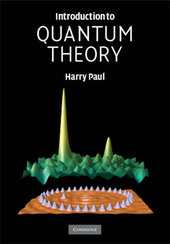
|
Introduction to Quantum Theory
Hardback
Main Details
| Title |
Introduction to Quantum Theory
|
| Authors and Contributors |
By (author) Harry Paul
|
| Physical Properties |
| Format:Hardback | | Pages:182 | | Dimensions(mm): Height 253,Width 178 |
|
| Category/Genre | Quantum physics |
|---|
| ISBN/Barcode |
9780521876933
|
| Classifications | Dewey:530.12 |
|---|
| Audience | | Tertiary Education (US: College) | | Professional & Vocational | |
|---|
| Illustrations |
20 Halftones, unspecified; 5 Line drawings, unspecified
|
|
Publishing Details |
| Publisher |
Cambridge University Press
|
| Imprint |
Cambridge University Press
|
| Publication Date |
5 June 2008 |
| Publication Country |
United Kingdom
|
Description
Since its emergence in the early twentieth century, quantum theory has become the fundamental physical paradigm, and is essential to our understanding of the world. Providing a deeper understanding of the microscopic world through quantum theory, this supplementary text reviews a wider range of topics than conventional textbooks. Emphasis is given to modern entanglement, quantum teleportation, and Bose-Einstein condensation. Macroscopic quantum effects of practical relevance, for example superconductivity and the quantum Hall effect, are also described. Looking to the future, the author discusses the exciting prospects for quantum computing. Physical, rather than formal, explanations are given, and mathematical formalism is kept to a minimum so readers can understand the concepts more easily. Theoretical discussions are combined with a description of the corresponding experimental results. This book is ideal for undergraduate and graduate students in quantum theory and quantum optics.
Author Biography
Harry Paul is a retired Professor of Theoretical Physics at the Institute of Physics, Humboldt University Berlin. His research interests are in nuclear physics and quantum theory, especially laser theory, nonlinear optics and quantum optics.
Reviews"The expertise of Paul shows in the easy transitions made between discussions of theory and experiment, particularly in subjects related to quantum optics." M.C. Ogilvie, Choice Magazine
|